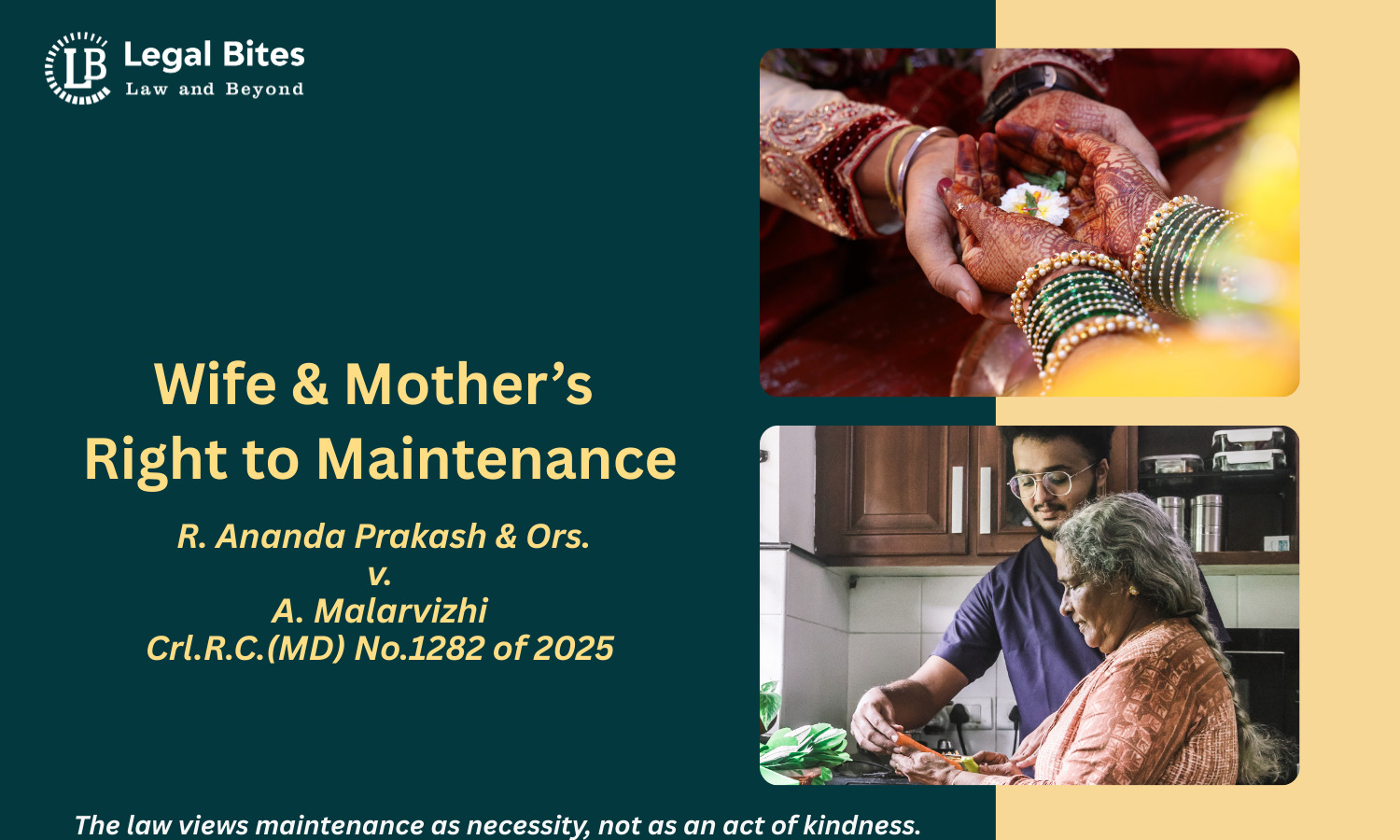
The obligation of a husband to maintain his wife and of children to support their aged parents lies at the heart of Indian family law. These duties, rooted in moral values and social expectations, have long been reinforced through statutory provisions like Section 125 of the Code of Criminal Procedure (CrPC), now continued under Section 144 of the Bharatiya Nagarik Suraksha Sanhita (BNSS), 2023. Maintenance serves a dual purpose: it prevents destitution and safeguards the dignity of women and elderly dependents who might otherwise be left vulnerable.
In R. Ananda Prakash & Ors. v. A. Malarvizhi, Crl.R.C.(MD) No.1282 of 2025, the Madras High Court reaffirmed that men cannot shirk their legal and moral duty to maintain their wives and mothers. The case involved a husband and his two sons challenging a Family Court order granting monthly maintenance to the wife/mother. The Court dismissed their plea, underscoring the irrefutable obligation men have towards their dependents.
Background of the Case
Parties Involved
Petitioners:
- R. Ananda Prakash – husband of the respondent.
- A. Ashwin – son of petitioner no.1 and respondent.
- A. Gururaj – son of petitioner no.1 and respondent.
Respondent:
- A. Malarvizhi – wife of the first petitioner and mother of the second and third petitioners.
Marriage and Separation
The marriage between the first petitioner and the respondent was solemnised in January 1986. For several decades, the couple lived together and had children. However, in 2015, the respondent allegedly left the matrimonial home and began residing separately.
After nearly four years of separation, in 2019, the respondent filed a petition under Section 125 CrPC before the Family Court, Madurai. She sought:
- Monthly maintenance of ₹40,000,
- Recovery of 290 sovereigns of gold jewellery, allegedly given at the time of marriage, and
- Recovery of ₹5,00,000 from the petitioners.
Family Court’s Order
On 18 March 2025, the Family Court, Madurai, partly allowed her claim. While it did not grant the entire amount demanded, it awarded ₹21,000 per month as maintenance to the respondent.
This order was challenged by the husband and sons in revision before the Madras High Court, Madurai Bench.
Court’s Observations
Justice Shamim Ahmed of the Madras High Court rejected the petitioners’ claims and upheld the Family Court’s decision. The Court laid down strong observations about the moral and legal duties of men:
1. Duty Towards Wife and Mother
The Court reiterated that it is a man’s legal and moral duty to maintain his wife and mother. This obligation stems not only from statutory provisions but also from deeply embedded social and cultural expectations.
- Children owe an inherent duty of care to their parents.
- Husbands are obligated to ensure that their wives live with dignity, especially in old age.
- These duties are not conditional upon convenience or financial hardship but are binding responsibilities.
2. Social and Emotional Value of Motherhood
The Court highlighted the immeasurable role of a mother in nurturing her children, stating that no amount of financial repayment could equal the pain and sacrifice endured by a mother during childbirth and upbringing. Supporting one’s mother is thus both a social responsibility and a familial duty.
3. Maintenance as a Protective Measure
Referring to Section 125 CrPC, the Court emphasised its beneficial nature:
- The provision is intended to prevent destitution of wives, mothers, and children.
- It provides essential relief to dependents who lack independent means of livelihood.
- Maintenance ensures dignity, sustenance, and protection against abandonment
4. Amount of Maintenance
The Court found that the ₹21,000 fixed by the Family Court was neither excessive nor disproportionate, considering:
- The rising cost of living,
- Inflation, and
- The standard of living necessary for the respondent.
5. No Grounds for Interference
Since the petitioners failed to demonstrate any illegality, impropriety, or incorrectness in the Family Court’s order, the High Court declined to interfere.
Accordingly, the Criminal Revision Petition was dismissed.
Analysis of the Judgment
Legal Framework
Section 125 CrPC (Now Section 144 BNSS, 2023)
- Provides for the maintenance of wives, children, and parents who are unable to support themselves.
- The provision is a measure of social justice, aimed at preventing destitution.
- It applies irrespective of religion or personal law.
Moral and Social Dimensions
The Court’s observations extend beyond legal duties, emphasising moral obligations. It equated neglect of one’s wife and mother with violation of social values, portraying maintenance not merely as a legal imposition but as a matter of respect, gratitude, and compassion.
Balancing Financial Hardship
Though the petitioners highlighted their financial struggles, the Court held that such hardships cannot override the fundamental duty of maintenance. This reflects a judicial trend of prioritising the dignity of dependents over the convenience of providers.
Broader Implications
Strengthening Women’s Rights
- Reinforces the right of wives to live with dignity and financial security.
- Discourages abandonment by husbands.
Elderly Care in Indian Law
- Reaffirms the obligation of children to maintain their parents, supplementing the Maintenance and Welfare of Parents and Senior Citizens Act, 2007.
Social Justice Orientation
- Shows the Court’s proactive role in ensuring that legal provisions serve their intended purpose—preventing destitution and upholding familial values.
Guidance for Lower Courts
- Establishes that maintenance amounts must reflect real living costs, not nominal sums.
- Ensures consistency in awarding meaningful relief.
Conclusion
Madras High Court’s ruling in R. Ananda Prakash & Ors. v. A. Malarvizhi underscores a timeless principle: men cannot escape the responsibility of maintaining their wife and mother. By dismissing the revision petition and upholding the Family Court’s order of ₹21,000 monthly maintenance, the Court reaffirmed that financial obligations within a family are not optional but binding duties rooted in law, morality, and social values.
Maintenance is not charity—it is a right. It preserves dignity, prevents destitution, and reflects gratitude for the irreplaceable sacrifices of mothers and the companionship of wives. This judgment reinforces that familial bonds carry legal force, ensuring that no woman or mother is left to suffer neglect.